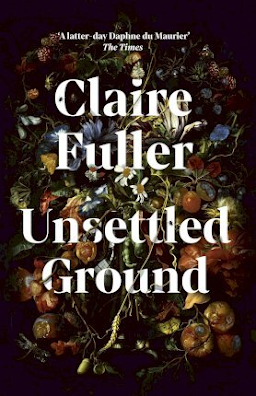Unsettled Ground by Claire Fuller
Claire Fuller seems to excel at novels about isolated characters and relationships that are both close and fractured - her previous books include characters such as a disturbed father who lives hidden with his daughter in a forest, an ageing academic whose adult daughters want some answers about the drowning of their mercurial mother, and a lonely, awkward spinster who, after her mother's death, becomes dangerously obsessed by a bohemian couple in the last summer of the 1960s.
This theme carries over into Unsettled Ground. Now in their early 50s, twins Jeanie and Julius have lived with their mother Dot in a tiny, rundown farm labourer's cottage all their lives. Their tenancy has been rent-free ever since an accident killed the twins' father while he was working for the landlord in his fields, but this also means the property has never been modernised - there's no indoor toilet, no heating, no television and no internet connection.
The Seeders survive mostly by eating and selling the fruit and vegetables they tend by hand, keeping chickens and shooting rabbits, with Julius taking on odd jobs and labouring for cash in hand - although he's hindered by what seems to be an intense phobia of being in a motor vehicle, which means he not only can't drive but is also violently sick when driven to a job by other people. Jeanie is hampered by a heart condition, seemingly a legacy of a childhood illness, and also by illiteracy, and yet is clearly the more intelligent of the pair.
The book begins with Dot's sudden death, and almost immediately, Jeanie and Julius's world starts to crumble. Dot, it seems, was not actually as self-sufficient as she's led the children to believe. and there are debts to be repaid as well as funeral costs to cover. Moreover, their landlord isn't prepared to allow their tenancy to continue, and the Seeders are thrown almost immediately into a vortex of misfortune. The family's insularity, cultivated by Dot's secrecy and mistrust, has left Jeanie in particular stubbornly incapable of openness - when she's paid by cheque for a part-time gardening job, she simply continues to work without cashing it, rather than explaining that she has no bank account.
Unsettled Ground is a powerful reminder of how quickly life can change, but also a damning indictment of the way we treat people who simply live a little differently to the rest of us. Jeanie can gut and skin a rabbit for a pie, make and mend clothes and keep an abundant vegetable garden thriving entirely by hand, but she can't fill in a form, read a letter or access the internet. When she's forced to stay briefly with a family friend, she feels an almost visceral disgust for the ordinary trappings of modern life that she's never experienced: television, ready-meals, dishwashers. Julius is less sheltered, but he's naively impulsive, almost childlike. It's all too easy to believe how someone like Julius or Jeanie could slip into homelessness in the blink of an eye, and it's the very plausibility of these elements that makes this novel an affecting read.
Unsettled Ground is brilliantly well-written, perceptive and full of perfectly-chosen details. There are times when Julius and Jeannie's mounting misfortunes make for a narrative that's almost oppressive in its bleakness, but somehow Fuller always pulls it back from the brink. There's a touch of the rural gothic in this book, which gives it a slightly haunting quality. The uncovering of Dot's secrets alone - secrets with which her children struggle to come to terms as they try to reconcile the mother they thought they knew with the person she really was - would be enough to keep most people turning the pages. Excellent stuff (again) from Claire Fuller.

Comments
Post a Comment